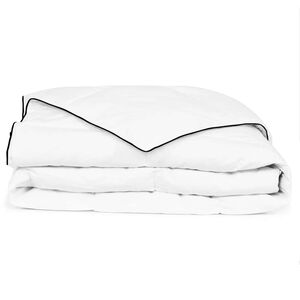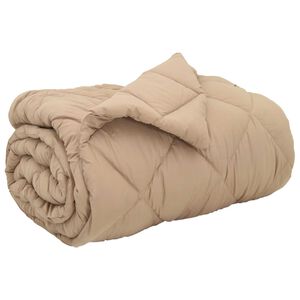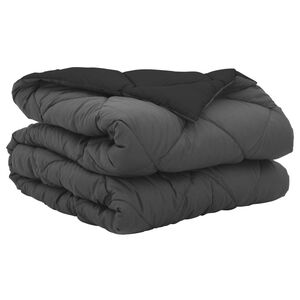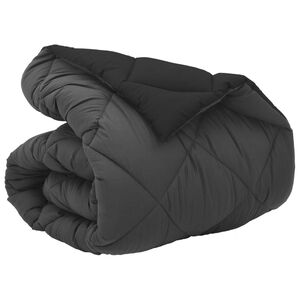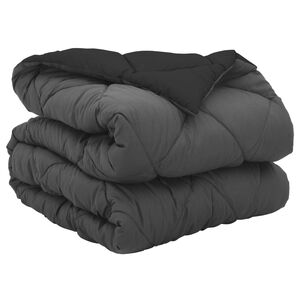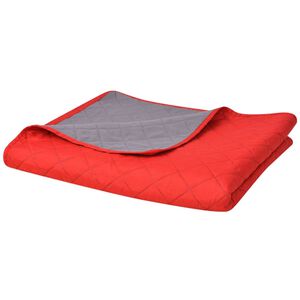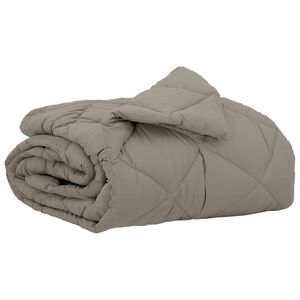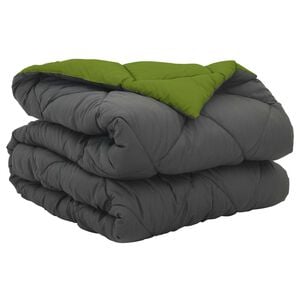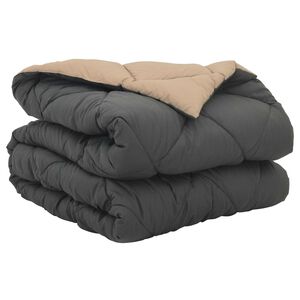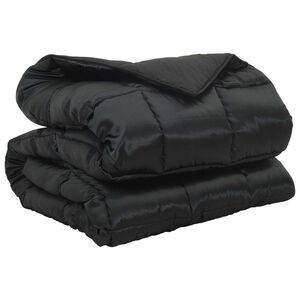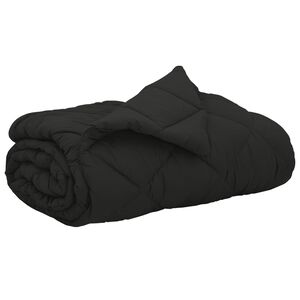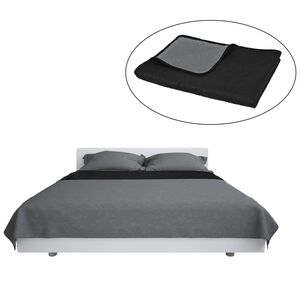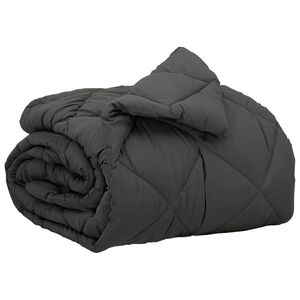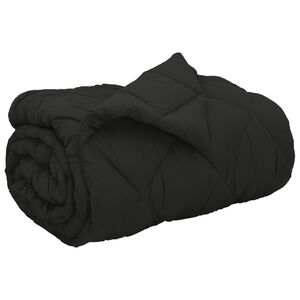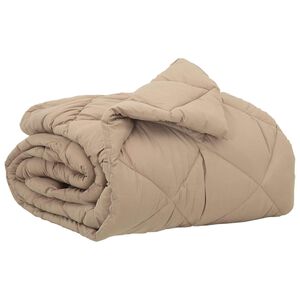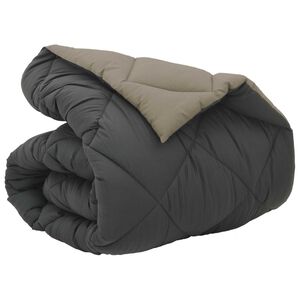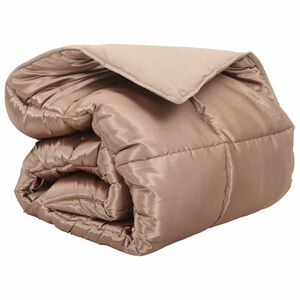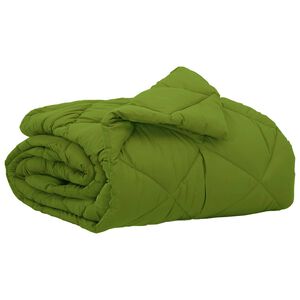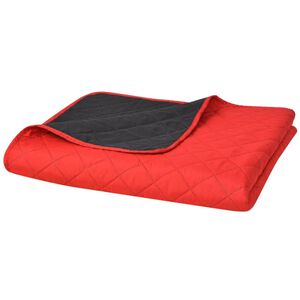24/7 deals
Free shipping
Get discounts with vidaXL+
Quilts & Duvets (49 Results)
How to select a duvet that meets your needs
The average person spends a third of their life sleeping, so it's important to invest in a warm and comfortable duvet for a good night's sleep. A good duvet should wick away moisture and balance temperature. Furthermore, it should also be of the correct size so as not to tag when two or more people are sharing, and it must not impede free movement under the covers.
However, with a wide range of options available on the market, finding a duvet that meets your needs can be an overwhelming experience. This is especially true for those buying duvets for the first time. But worry not – we're here to help. We've put together this comprehensive guide to help you find the perfect duvet.
What fill material should you choose for your duvet?
Generally, duvet filling can be placed into two categories: natural and synthetic. Besides the cover material, choosing the right fill material is important in ensuring a comfortable night's sleep. Duvet fillings can be expressed in two ratings: tog and fill power.
Tog rating refers to the material's ability to trap warm air and usually ranges from 2.5 to 13.5. Duvets with a low tog rating are best suited for warmer months, while those high up the scale are suited for colder months. Fill power is measured in grams per square metre. The higher the fill power, the better quality and longevity you'll get from a duvet.
Below, we examine the two categories of fill materials to help you make an informed decision when shopping for a duvet.
Natural fillings
Natural filling duvets have a lot of great qualities. First, they are effective in insulating heating and are ideal for use throughout the years because of their breathability. They also last longer than their synthetic counterparts. Some can also be tossed in the washing machine. However, duvets with natural fillings are more expensive. Here are the most common natural fillings for duvets.
Down
Down is the soft and fluffy material gathered from the undercoat of ducks and geese. Duvets with down filling are soft, lightweight, and provide an excellent moisture-wicking ability to ensure a comfortable night's sleep. Goose down duvet is softer, warmer, and lighter. They also cost more than duck down duvets which fall behind a bit in these aspects. Another important factor to look out for is any indication from the manufacturer about allergen and dust mite testing because down and mite tend to cause flare-ups for people who are allergic.
Feather
These duvets are filled with the larger outer feathers of birds. They are usually heavier and less fluffy than those filled with down because feathers are larger and flatter. Some users see the extra heft of feather duvets as an advantage because of the downforce they provide, which is similar to a weighted blanket. The main downside of these duvets is that the quill can poke through.
Wool
Natural and sustainable, wool products are easy to replenish and require less energy to produce. In addition, duvets made from wool are naturally resistant to mildew, mould, and dust mite because of the material's unique qualities. Wool is also one of the few materials that can help regulate temperature by wicking away sweat during summer. It can also function as an insulator, keeping you warm during winter. Wool duvets are also cheaper than down and feather duvets.
Cotton
Another great fill material for duvet, cotton is breathable, lightweight, machine-washable, and hypoallergenic. Cotton duvets will help you stay cool during warm months. In addition, cotton is more affordable than other fillings. However, cotton is not as thick as other materials, so it may not be the best option for colder months.
Synthetic fillings
Compared to natural fillings, synthetic fillings fall short on durability, insulation, and softness. However, this doesn't mean they don't have their advantages. Synthetic fill duvets are hypoallergenic and a lot easier to maintain. They are also cheaper than natural fill duvets. Here are the common synthetic fillings for duvets.
Hollowfibre is made from spun polyester. Duvets filled with this material are lightweight and spring, providing excellent breathability and warmth for a good night's sleep.
Microfiber-filled duvets feel more like down-filled duvets. This material has densely woven fibres that feel cosy and warm, ensuring you sleep soundly throughout the night.
What material is best for a duvet shell or outer fabric?
Your choice of material for the duvet shell will affect the comfort and style of the duvet. There are a few important things to keep in mind when selecting a duvet cover material. These include climate, skin sensitivity or allergies, preferred sleep temperature, durability, and ease of cleaning. Below, we discuss the various types of materials for duvet shells.
Cotton
Probably the most common material for duvet covers, cotton is soft, breathable and long-lasting. In addition, cotton can be dyed in a wide range of colours to match your colour palette. Furthermore, it requires little maintenance, and you can choose from different cotton varieties. Long-staple cotton varieties like Egyptian cotton create a soft, silky fabric that is resistant to tearing and lasts longer.
Flannel
If you're looking for extra cosiness during colder nights, pick a duvet shell made from flannel. Also known as brushed cotton, flannel is made by brushing cotton fibres to create a piling that feels softer to the touch and holds warmth better than regular cotton.
Polyester
Polyester duvet shells are ideal for people looking for a fabric that does not fade or wrinkle over time. Since polyester is a synthetic material, it's less expensive than natural options. However, it's less breathable and often traps heat and moisture under the sheets. Polyester is a good option for someone who prefers a warmer sleep environment.
What duvet size do you need?
Once you’ve chosen your preferred material for fillings and outer fabric, the next step is choosing the right duvet size. Duvets come in standardised sizes corresponding to the different bed mattress sizes. It's a good idea to choose a larger size so the duvet can hang over the edges. Let’s look at the different duvet sizes.
Single size duvet
A single-size duvet is designed for single beds and is generally ideal for one sleep. The standard size of single duvets is about 135 cm x 200 cm. A larger size will be too big for a single bed.
Double size duvet
The next duvet size is the double size, and it's designed for a standard double bed. It can comfortably accommodate two sleepers. A double-size duvet measures about 200 cm x 200 cm, so they are square in shape.
King size duvet
A king-size duvet can accommodate up to two people, and it's designed for a king size bed. The standard size of king-size duvets is about 230 cm x 220 cm.
Super king-size duvet
This is one of the largest duvet sizes on the market. The super king-size duvet, which measures about 260 cm x 220 cm, is designed for a super king-size bed. The length is approximately the same length as that of the king-size duvet, but it's usually wider.
Choosing a duvet based on season
Another important factor to keep in mind when shopping for a duvet is season. It's a good idea to have two duvets – one for the warm season and another one for the cold season. If you don’t want to deal with two duvets, you can opt for an all-season duvet. Below, we look at the different duvets for the different seasons.
Summer duvet
If you're a warm sleeper, a summer duvet is a perfect option for you. Some people get chilly at night, while others tend to overheat and sweat at night. Choose a summer duvet if it gets hot at night or you prefer sleeping at a warm temperature. Summer duvets are more breathable, lighter, and have a lower tog rating, usually not exceeding 7.5. You can optimise the fee of a summer duvet by choosing an appropriate duvet cover.
Winter duvet
For those who prefer a warmer blanket, a winter duvet is the best option for you. Winter duvets are thicker, heavier, and have a higher toy rating, usually as high as 15. So they are ideal for colder nights. As with summer duvets, you can optimise your sleep experience by choosing the right cover, preferably something warm and durable like cotton or flannel.
All-season duvet
If you want a duvet that gives you the best of both worlds, choose an all-season duvet. These duvets will suit your sleeping needs in both summer and winter months as they combine two duvets with different top scores.
How to care for your duvet
It’s advisable to wash your duvet once every four months. However, it's also important to check the manufacturer's instructions on cleaning, as most natural duvets are dry clean only. If your duvet is machine washable and there's a stubborn stain you need to remove, shake the filling material away from the area and apply a detergent before loading it into the washing machine. Use normal spin to wash the duvet and air dry it. Then run a warm iron over the duvet to remove bacteria.
Shop duvets at vidaXL
Here at vidaXL, we have a large collection of superior quality duvets in different materials and sizes. Our commitment has always been to offer customers the best duvets, and we do so by sourcing from leading manufacturers. All our duvets meet the highest quality standards, and you're sure to find the perfect option whether you're looking for a summer, winter, or all-season duvet.



